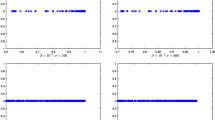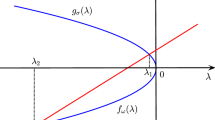Abstract
The numerical discretization of the optimal control problems constrained with certain kind of time-dependent fractional diffusion equations leads to a class of highly structured block two-by-two linear systems. We present a different and economic implementation of the approximated rotated block diagonal (ARBD) preconditioner, denoted briefly as the ARBDe preconditioner, for solving this class of linear systems effectively by making use of the correspondingly preconditioned Krylov subspace iteration methods such as the ARBDe-preconditioned flexible GMRES (FGMRES) method, or the ARBDe-FGMRES method. Compared with the ARBD-GMRES method constructed and analyzed by Bai and Lu in 2021 (Appl. Numer. Math. 163:126–146), the ARBDe-FGMRES method requires a lower computational complexity and can achieve much higher computational efficiency in practical applications. With numerical experiments, we have examined and confirmed the robustness, accuracy, and effectiveness of the ARBDe-FGMRES method in solving this class of discrete optimal control problems.
Similar content being viewed by others
References
Antil, H., Otárola, E.: A FEM for an optimal control problem of fractional powers of elliptic operators. SIAM J. Control Optim. 53, 3432–3456 (2015)
Bai, Z.-Z.: Sharp error bounds of some Krylov subspace methods for non-Hermitian linear systems. Appl. Math. Comput. 109, 273–285 (2000)
Bai, Z.-Z.: Motivations and realizations of Krylov subspace methods for large sparse linear systems. J. Comput. Appl. Math. 283, 71–78 (2015)
Bai, Z.-Z., Lu, K.-Y.: Optimal rotated block-diagonal preconditioning for discretized optimal control problems constrained with fractional time-dependent diffusive equations. Appl. Numer. Math. 163, 126–146 (2021)
Bai, Z.-Z., Benzi, M., Chen, F., Wang, Z.-Q.: Preconditioned MHSS iteration methods for a class of block two-by-two linear systems with applications to distributed control problems. IMA J. Numer. Anal. 33, 343–369 (2013)
Bai, Z.-Z., Pan, J.-Y.: Matrix Analysis and Computations. SIAM, Philadelphia, PA (2021)
Benson, D.A., Wheatcraft, S.W., Meerschaert, M.M.: Application of a fractional advection-dispersion equation. Water Resour. Res. 36, 1403–1412 (2000)
Braess, D.: Finite Elements. Cambridge University Press, Cambridge (1997)
Chan, R.H., **, X.-Q.: An Introduction to Iterative Toeplitz Solvers. SIAM, Philadelphia, PA (2007)
Du, N., Wang, H., Liu, W.-B.: A fast gradient projection method for a constrained fractional optimal control. J. Sci. Comput. 68, 1–20 (2016)
Elman, H.C., Silvester, D.J., Wathen, A.J.: Finite Elements and Fast Iterative Solvers: With Applications in Incompressible Fluid Dynamics. Oxford University Press, New York (2005)
Kirchner, J.W., Feng, X.-H., Neal, C.: Fractal stream chemistry and its implications for contaminant transport in catchments. Nature 403, 524–527 (2000)
Li, C.-P., Cai, M.: Theory and Numerical Approximations of Fractional Integrals and Derivatives. SIAM, Philadelphia, PA (2019)
Mathieu, B., Melchior, P., Oustaloup, A., Ceyral, Ch.: Fractional differentiation for edge detection. Signal Process. 83, 2421–2432 (2003)
Podlubny, I.: Fractional Differential Equations, Math. Sci. Engrg 198. Academic Press, San Diego (1999)
Razminia, K., Razminia, A., Baleanu, D.: Investigation of the fractional diffusion equation based on generalized integral quadrature technique. Appl. Math. Model. 39, 86–98 (2015)
Saad, Y.: Iterative Methods for Sparse Linear Systems, 2nd edn. SIAM, Philadelphia, PA (2003)
Samko, S.G., Kilbas, A.A., Marichev, O.I.: Fractional Integrals and Derivatives: Theory and Applications. Gordon and Breach Science Publishers, Yverdon (1993)
van der Vorst, H.A.: Iterative Krylov Methods for Large Linear Systems. Cambridge University Press, Cambridge (2003)
Zaslavsky, G.M.: Chaos, fractional kinetics, and anomalous transport. Phys. Rep. 371, 461–580 (2002)
Acknowledgements
The authors are very much indebted to the referees for their constructive suggestions and insightful comments, which greatly improved the original manuscript of this paper.
Funding
This work is supported by The National Natural Science Foundation of China (Nos. 12071472, 12001048, and 11671393), and The Science and Technology Planning Projects of Bei**g Municipal Education Commission (No. KM202011232019), P.R. China.
Author information
Authors and Affiliations
Corresponding author
Ethics declarations
Conflict of interest
The authors declare no competing interests.
Additional information
Data availability
Data sharing not applicable to this article as no datasets were generated or analyzed during the current study.
Publisher’s note
Springer Nature remains neutral with regard to jurisdictional claims in published maps and institutional affiliations.
Rights and permissions
Springer Nature or its licensor holds exclusive rights to this article under a publishing agreement with the author(s) or other rightsholder(s); author self-archiving of the accepted manuscript version of this article is solely governed by the terms of such publishing agreement and applicable law.
About this article
Cite this article
Bai, ZZ., Lu, KY. An economic implementation of the optimal rotated block-diagonal preconditioning method. Numer Algor 93, 85–101 (2023). https://doi.org/10.1007/s11075-022-01404-w
Received:
Accepted:
Published:
Issue Date:
DOI: https://doi.org/10.1007/s11075-022-01404-w
Keywords
- Time-dependent fractional optimal control problem
- Block two-by-two linear system
- Preconditioning
- Flexible GMRES method
- BiCG iteration




